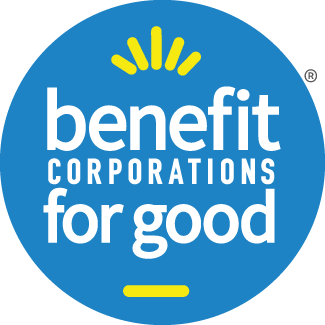How an Award-Winning Marketing Expert Told the World What She Stands Up For
Charlotte Chipperfield, owner of Chipperfield Media, shares her certificate that certifies her company as a triple bottom line business.
Charlotte Chipperfield and her award-winning marketing consulting firm know how challenging it can be to get your message heard in an information-overloaded world. She helps conscious business leaders and companies integrate an intentional and sustainable marketing framework that saves time, energy, and money to be seen and heard in the digital space. That sustainability carries into her own personal values as she believes a business must do more than just make a profit. It must serve people and planet as well.
Enter certification as an Oregon Benefit Company practicing the Triple Bottom Line of People, Planet and Profit. These forward-thinking businesses are all aligned in their belief of doing business for the greater good.
Recently, we interviewed Charlotte about becoming a certified Oregon Benefit Company. Here’s what she had to say about it, the motivation for doing it and why it was right for Chipperfield Media.
1. What motivated you to become a Benefit Company?
From the time I launched my company in 2014, I knew I wanted to create more impact than just generating sales. It has always been a part of my DNA to give back and contribute to my community. However, as a business owner, it was challenging to find examples of how this could be incorporated into my business that wasn’t seen as a PR stunt. As I began to do more research, I realized that there were many business owners who also shared similar values and when I learned about the Benefit Company certification, I didn’t hesitate. I had found my tribe.
2. Was it difficult getting internal support for moving toward this model?
As a solopreneur, it was pretty easy to get myself onboard ;) With that being said, I did have to carve out the time to learn more about the process and gather the information to ensure this was the right process for me and that it matched the overall vision for my company. It didn’t take long for me to recognize that both my personal and company values were strongly aligned. Becoming a Benefit Company was the right next step.
3. How long did it take you to officially become a Benefit Company?
The process was straightforward and didn’t take long. Tom and Mary Anne were wonderful at answering questions and laying out the path to certification clearly.
4. Have you seen any change in culture since you became a Benefit Company?
I’ve noticed a change in the way people engage with me and my company. There is a sense of curiosity to learn more about why I became certified and why that is important to me. It has been a great connection tool for building rapport with potential clients who are building companies focused on the triple bottom line whether they are certified or not.
5. Have you experienced any positive outcomes since becoming a Benefit Company?
As I mentioned in the question above, it’s been a great opportunity to connect with other industry leaders and connect with potential clients who share a similar value system.
6. Would you recommend this business model to others? Why or why not?
I would absolutely recommend this business model to others. I believe this is the future of business to create real, sustainable change.
7. What is the most important trait to have as a conscientious leader of a Benefit Company?
The most important trait for a conscious business leader is to lead with their heart as much as they are leading with their brain. When strategy meets empathy, the possibilities expand creating more opportunities over the long-term.
8. What lessons have you learned in the process?
I don’t know if I’ve learned any lessons but rather found validation that I’m not alone in my approach to business. When you live and operate in a capitalist society, it’s easy to get caught up in the hustle of making more money or becoming so focused on getting your business to a specific revenue mark. At the end of the day, money does matter, but impact matters more. For me, having a community that keeps me accountable and serves as a reminder that I am not alone in this philosophy towards business has been empowering.
9. Is being a Benefit Company part of your current brand message?
It is a part of my messaging but as a marketing and brand messaging expert, I need to lean into this more!
10. What is the single best reason you'd give for another company or peer to become a Benefit Company?
I would invite someone considering the certification to think about their bigger vision and consider how they are building something bigger than yourself? Think about how can you create more impact that benefits all stakeholders from employees, investors, customers, the community and the environment?
If you can create value above and beyond just dollar signs, it might be time to consider being a Benefit Company.
You can learn more about Chipperfield Media here.
If you want to know more about why your business should become a benefit corporation, watch this.
Learn more about the 6 simple steps to becoming a benefit company or benefit corporation here.
~benefitcorporationsforgood.com~

